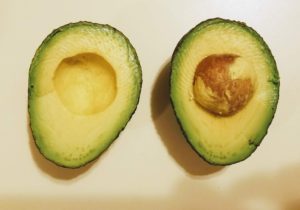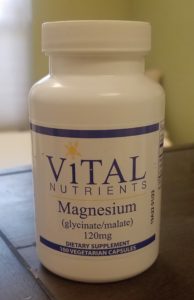Magnesium (Mg) is a very important mineral in the body. It is also a mineral that gets depleted regularly. It affects many different systems in our body but is often overlooked. We can get this nutrient from the foods we eat but our overconsumption of alcohol and caffeine eliminates it faster than we can replenish it. When we are deficient, we may have tight, achey muscles, muscle cramps, constipation, fatigue, irregular heartbeat, insomnia, osteoporosis, and migraines.
What Foods Contain Magnesium?
Be sure to include many of these foods in your diet to obtain this necessary nutrient:

- leafy greens
- avocados
- nuts (almond, cashews, Brazilian nuts)
- dark chocolate (good excuse for an mid-morning snack!)
- seeds (like pumpkin, flax, chia)
- legumes (lentils, chickpeas, beans)
- whole grains (wheat, oat, barley)
- tofu
- fish (salmon, mackerel and halibut)
- bananas
What is the Difference between Each Type of Magnesium?
Magnesium must bind to another molecule to stabilize it. Therefore, the name of the supplement indicates which substance is bonded to the magnesium molecule. For instance, magnesium oxide (MgO) is bonded to oxygen while magnesium citrate is bonded to citric acid. The function of this added molecule factors into your choice of supplement.
Absorption is also a major consideration. It does no good to take supplements if your body doesn’t absorb them. The rate and extent that a substance is absorbed into the body and available for physiological activity is called bioavailability. Bioavailability varies greatly between each supplements. Below, I break down these differences:
Magnesium oxide
This supplement is only about 4% bioavailable to the body and is found in Milk of Magnesia. Typically, this is used to treat constipation because your body is not absorbing much from this form.
Magnesium citrate
Derived from citric acid, this is one of the most popular supplements. It has great bioavailability and has a good price point compared to other supplements. It helps with constipation and acid indigestion. Because it works by pulling water into the intestines to encourage softer stools, it can cause an imbalance of minerals in the body. It is ok for occasional constipation but not ideal to use regularly. Also, some people may notice a flare up in bladder issues and inflammation because of the citric acid.
Magnesium glycinate
The amino acid glycine has a calming effect on the mind and body. It is a great choice for those of us who feel stressed with muscle tension. It has good bioavailabilty but doesn’t affect the bowels as much as other forms of magnesium. I highly recommend this form or one mixed with magnesium malate (see below).

One of my favorite blends – glycinate and malate
Magnesium malate
The malic acid contained in this form can contribute to higher energy levels. It can also help regulate blood pressure and reduce cholesterol. It also helps relieve constipation. I feel like this is something most of us can use so I definitely recommend this form combined with the magnesium glycinate (see above). This form is particularly good for people with fibromyalgia to oxygenate the muscles.
Magnesium orotate
Orotic acid, formerly known as Vitamin B13, is becoming known as a performance enhancer in the athletic realm. It enhances ATP levels and uptake of muscle glycogen (read more here for a scientific explanation). Essentially, this supplement is a great way for athletes to replenish Mg and get the benefit of orotic acid. Also, orotic acid has been found to help gout because of the competition of orotate and urate at the hURAT1 transporter (click here for the article).
Magnesium l-threonate
This form of Mg crosses the blood brain barrier and has been studied for Alzheimer’s disease and other cognitive decline. It is a good choice for overall brain health and lowering symptoms of hyperactivity. It can help with memory and in animal studies helped restore the functioning of aging neurons. This form has a smaller effect on bowels than other forms of magnesium. But overall, an excellent preventative form of magnesium for aging populations or with other neurological disorders.
Magnesium chloride
Also called magnesium salts, magnesium flakes, or magnesium oil. This type of topical magnesium is different than Epsom salts (see magnesium sulfate below). It can be an oil, gel, or lotion or in the form of flakes. It has a high absorption rate and helps with muscle cramps and relaxation. By bypassing the digestive tract, it is a great way to get magnesium into the body without the laxative side effects. Ancient Minerals has a wonderful oil and lotion that I use frequently in my clinic.
Magnesium sulfate
Also known as epsom salts. Taking a bath with epsom salts is a great way to relax muscles, improve sleep, and promote relaxation. This form can also help with constipation. The body will absorb magnesium from the bath and can affect the bowels gently. If taken internally, it tastes awful and has a very strong laxative effect. It brings water into the intestines so can cause a mineral imbalance. I would definitely recommend using this for baths instead of ingesting it.
There is a lot more to say about this wonderful macronutrient in our bodies but I hope this helps you understand a bit more about the different kinds of magnesium available. I hope you are able to find the right supplement for you to treat your individual symptoms. Sign up to use my online pharmacy here from Wellevate to receive discounted supplements or email me for an invitation.
If you have any questions, please get in touch with me or feel free to schedule an appointment with me here and we can discuss this further.
